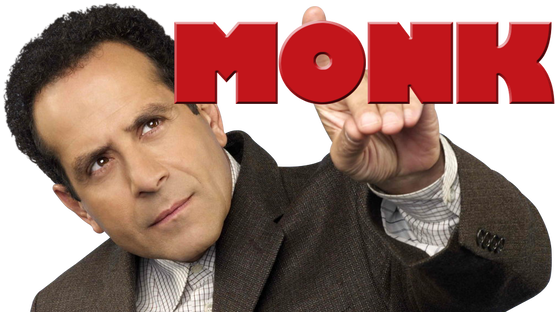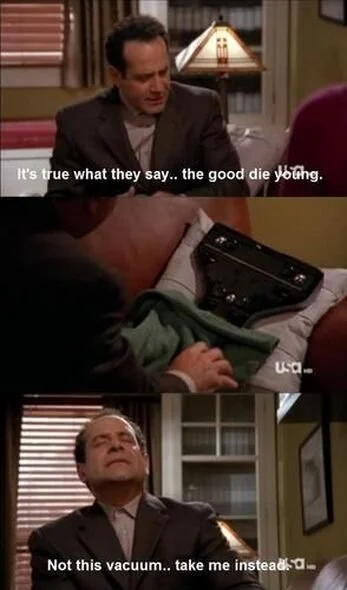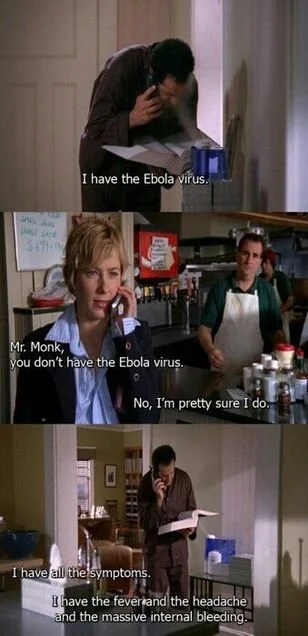It’s a Jungle Out There
(Originally written October 1, 2020)
If the Coronavirus pandemic is good for anything, it’s watching TV. But with everything going the way it is in the world, sometimes what you need is something comforting. With a combination of nostalgia, well-crafted stories, and lovable characters, Monk is one of my favorite go-tos in times like these.
(It’s also appropriate to a time that revolves around cleanliness.)
Adrian Monk (Tony Shalhoub) was a highly successful detective with the San Francisco Police Department for years, until the love of his life, Trudy, a journalist, was murdered by a car bomb. Monk was never the same again. He left the police force after a mental breakdown, and after a long period of recovery, returned to crime solving as a private consultant. Despite debilitating phobias and compulsions, he’s able to function just enough to apply his remarkable crime-solving skills to the cases the SFPD can’t solve themselves, with the help of his nurse, Sharona Fleming (Bitty Schram). Sharona was replaced in season 2 by an assistant, Natalie (Traylor Howard), but Sharona’s influence on Monk was clearly indispensable in allowing Monk to return to his calling as a detective.
Even before the tragedy of his wife’s death, Adrian Monk struggled with obsessive tendencies, countless phobias, and other anxieties. He found comfort in Trudy that he was never able to find anywhere else, and so he was able to use his obsessions to his advantage in his work. Trudy brought him peace after a lifetime of being teased and bullied for his eccentricities that stemmed not only from his inherent mental health struggles, but also from his sterile and difficult home life. His brother, Ambrose (played by one of my favorite guest stars, John Turturro), suffers from Agoraphobia and is unable to leave the house, leaving Adrian as the somehow more high-functioning member of the family.
For a basic cable procedural detective show about a guy with obsessive compulsive tendencies, Monk really accomplished much more than it could have throughout its 8 seasons, 2002-2009 on USA. It strikes a perfect balance between monster-of-the-week episodes and the overarching storyline of Monk’s personal struggles.
Each episode features an intriguing murder mystery, with Columbo-like, easily-missed clues that only someone like Monk, obsessed with details, would notice. As Monk himself says often, “It’s a gift… and a curse.” And, like in Columbo, the murderers often underestimate the detective based on his difficulties in dealing with daily life, as well as his obsession with the details that end up being their downfall.
The thing that I appreciate deeply about Monk is that it could have been wildly insulting and inappropriate in the way that it handled Monk’s mental health issues, but it never was. I noticed while rewatching that, while it's heavily implied, it is never specifically mentioned that Monk has OCD--only that he has an anxiety disorder, and a few comments that he is a compulsive person (as far as I can tell, it’s only the marketing of the show that actually labels him as OCD: things like “Obsessive Compulsive Detective”).
OCD is a highly misunderstood condition, and it would have been easy for the series to bank on that and stereotype Monk as a character. While it does poke fun at Monk’s obsessive traits, his phobias, and his eccentricities, it does so lovingly, while also showing how devastating those traits, phobias, and eccentricities are to his life. It’s clear that having OCD--or OCD-like tendencies--is not funny, even when sometimes the results of it are. While most of the series is largely light-hearted, there are scenes and even whole episodes exploring Monk’s psyche that are deeply sad.
Monk also sees a psychiatrist (initially played by Stanley Kamel, then replaced by a new therapist played by Hector Elizondo following Kamel’s death) on a frequent basis, which I think is an important detail. He knows he needs help, and he gets help. His therapy sessions, while sometimes entertaining, are honest and accurate. With so few depictions of characters, especially men, attending therapy sessions and taking them seriously, Monk provides an example of how therapy can be beneficial not just for those with serious disorders, but for anyone.
Particularly in these difficult social and political times, it’s worth noting that Monk is also sensitive in its depiction of crime and crime solving. Far from something like The Wire, which explores societal issues related to race, class, and poverty, Monk never oversteps its bounds in exploring the world of crime. It never punches down, and doesn’t pretend that it has anything significant to add to the important but difficult conversations surrounding these issues. The show instead focuses largely on toppling arrogant, often wealthy, murderers who use murder as a selfish means to an end.
Take, for example, the season 4 episode “Mr. Monk and the Astronaut,” in which a cocky astronaut (Jeffrey Donovan) murders a woman with whom he had an affair but arranges circumstances to appear as though the murder took place when he was in space. Or the season 2 episode “Mr. Monk Goes to Jail,” in which a prison counselor poisons a death row inmate and blames the murder on another notorious prisoner (played by Danny Trejo). And we can’t forget the recurring villain, “Dale the Whale” (played in one of his appearances by none other than Tim Curry), a morbidly obese white collar criminal who uses his wealth and influence to gain favors while in prison.
Though Captain Stottlemeyer (Ted Levine), Monk’s former Commanding Officer and current champion within the police department, is a brash, short-fused guy’s guy, he knows his boundaries. Even when he does take a step too far, the show makes it clear that it’s unacceptable. Episodes frequently deal with Stottlemeyer’s recurring anger issues and how they affect his life and his marriage, and show him working to change himself for the better. And he really has a soft spot for Adrian Monk; his outbursts often have to do with challenges put in Monk’s way, and he is never afraid to make his affection for Adrian known. Stottlemeyer’s Lieutenant, Randy Disher (Jason Gray-Stanford), is a bit of a doofus, but a lovable doofus who is dying to impress, a perfect foil for Stottlemeyer’s more aggressive personality. Between Stottlemeyer, Disher, and Monk, the show runs a pretty wide gamut of male archetypes, and each one adds something important to the ensemble.
The women, too, are all strong, loving, and competent in their own way. Sharona and Natalie are both single mothers, although Sharona is brash and no-nonsense while Natalie is a little less domineering. Trudy offers a calm, peaceful presence, although it’s hard to tell how much of what we see of Trudy is idealized in Monk’s memory. Regardless, there are so many great examples of well-developed characters who relate to each other in a healthy way.
What makes Monk really work, though, is the genius of Tony Shalhoub (who I believe is a deeply underrated actor). Adrian Monk is a brilliant character, full of contradictions, quirks, strengths, victories, losses, struggles, and all of those things that make us all human. He could easily have been a dreadful character, but Shalhoub gives him a depth, a warmth, and a reality that makes him believable despite his over-the-top qualities.
I’ve mentioned in previous posts that I have watched a ton of crime procedurals. There are several that I go back to on occasion, but Monk is an absolute favorite. Is it the best show I’ve ever watched? No. But for what it is, it’s brilliant. It has so much heart, gently touches on so many important ideas, and is consistently entertaining over a pretty respectable number of seasons. It even has a really satisfying ending, though I won’t spoil it here. You’ll just have to watch.
My favorite episode: "Mr. Monk and the Kid," (S3, Ep16): When a toddler in foster care discovers a human finger in the park, Monk takes care of the boy while the police investigate. As the investigation progresses, Monk becomes more and more attached to the boy, finding joy and satisfaction in parenthood, however temporary it may be. When the case is solved and the boy faces a continuing future in foster care, Monk wants to adopt him, but he comes to the realization that the life he would provide would be less than ideal for the happy-go-lucky child. This episode is so emotional that I often skip it in my re-watches. It's beautiful, and it's tragic, and it so perfectly encapsulates the overall method Monk takes to showing the humor and the consequences of Adrian's neuroses. It's a fantastic episode. Just get out the tissues.
Behind the Scenes:
Tony Shalhoub auditioned for the part of Kramer on Seinfeld, and Michael Richards was considered for the part of Monk. Richards passed on Monk and went on to play Kramer, winning three Emmys for the role. Shalhoub also won three Emmys for his portrayal of Monk.
The name Adrian Monk contains 10 letters, Monk's favorite number.
Many elements of the show were a nod to Sherlock Holmes: Sharona Fleming is the Dr. Watson of the team, Stottlemeyer and Disher equate to Inspector Lestrade, Adrian's brother Ambrose is Sherlock's brother Mycroft, and Harold Krenshaw (Monk's nemesis, played by Tim Bagley) is Moriarty. Even Monk's second therapist, Dr. Bell, is a reference to Dr. Joseph Bell, a brilliant surgeon who inpsired the character of Sherlock Holmes.
Stay Tuned for Our Next Episode:
Star Trek: The Original Series
Previously on Of Sight, Sound, and Mind:
NewsRadio



